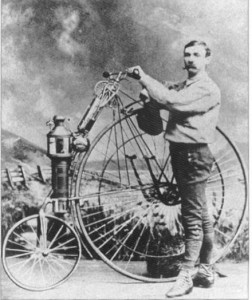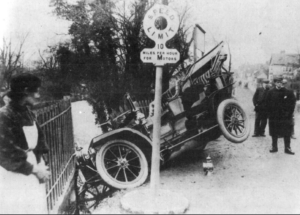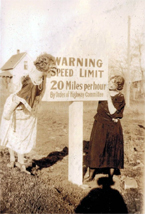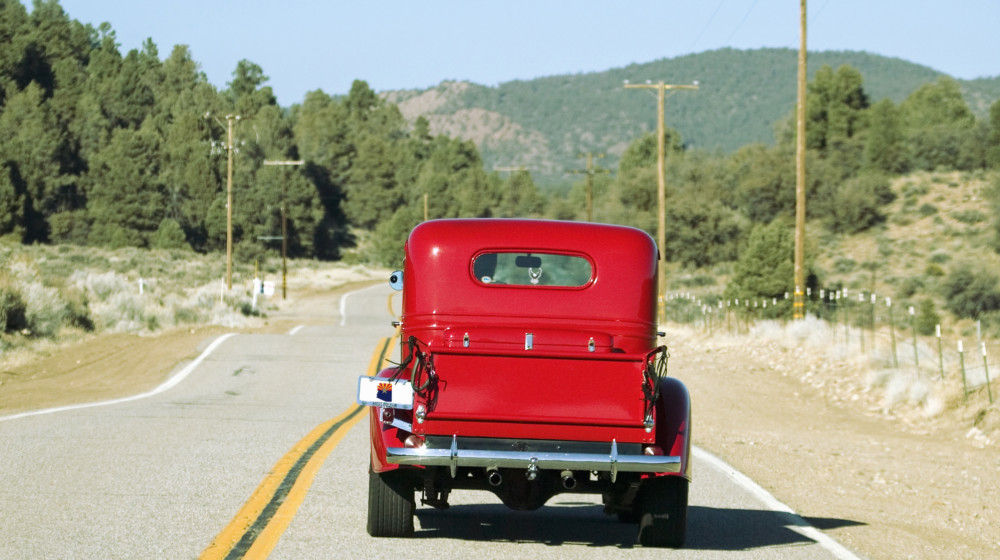It's the Limit
Did you know…
There is nothing like getting on the open road and putting that pedal to the metal. That is, until you pass that speed trap, the flashing lights go on, and that’s it for the open road! For better or worse, speed limits have been around for a long time – long before there were even cars to drive. Horses, and all those horse-powered vehicles (carriages, wagons, buggies, etc.), were known to move quickly as well, and often were involved in accidents due to speed.

Phoenician Lucius Copeland pictured with his steam powered moto-cycle.
The earliest known speed limit in America was set in 1653 New Amsterdam (now New York, still owned by the Dutch at that time). The colony edict stated, “No wagons, carts or sleighs shall be run, rode or driven at a gallop.” If you did, you had to pay a fine of two pounds, Flemish – approximately $150 today. In turn of the century Boston – turn of the 18th century, that is – the city council ordered that, “No person whatsoever Shall at any time hereafter ride or drive a gallop or other extream (sic) pace within any of the Streets, lanes, or alleys in the Town on penalty of forfeiting three Shillings for every such offense…” (For reference, a horse at a gallop travels at around 25mph.)
When the Rosson House was built, Phoenix had dirt roads, and the speed limit was 6 miles per hour (established the year prior). Phoenix was small enough to be able to traverse easily on foot, but people also used horses, and horse-drawn vehicles, the Phoenix streetcar (installed September 28, 1893), bicycles, and even early versions of motorized bicycles and tricycles to travel. In 1900, automobiles were added to the mix, and the city (along with many other metro areas) was left to catch up as best it could, creating a muddle of different traffic laws for different kind of vehicles. “Immoderate speeds,” including galloping, were restricted for horses, bicycles were limited to traveling 8 miles per hour (1896), and the train was moderated to traveling 4 miles per hour within Phoenix city limits (1898). Most vehicles could legally enjoy slightly higher speeds outside of the city. Connecticut was the first state to enact a speed limit law – 12mph within city limits, and 15mph on county roads.
 The problem with a 6mph speed limit is that motorized vehicles could go so much faster. Even back in 1887, Phoenix resident Lucius Copeland’s steam powered moto-cycle (a bicycle with a motor attached) could top out at 12mph. And the Winton motor carriage, purchased by Phoenician J. M. Swetnam in October 1900, was capable of driving at 20mph. Even though that was less than a horse’s gallop at 25mph, the newness of the automobile made many people nervous. An article in the August 27, 1903 edition of the Arizona Republican reported that Thomas Edison was working on inventing a motor that would be able to, “Propel a (car) at high and murderous velocities.” Its speed? 25mph.
The problem with a 6mph speed limit is that motorized vehicles could go so much faster. Even back in 1887, Phoenix resident Lucius Copeland’s steam powered moto-cycle (a bicycle with a motor attached) could top out at 12mph. And the Winton motor carriage, purchased by Phoenician J. M. Swetnam in October 1900, was capable of driving at 20mph. Even though that was less than a horse’s gallop at 25mph, the newness of the automobile made many people nervous. An article in the August 27, 1903 edition of the Arizona Republican reported that Thomas Edison was working on inventing a motor that would be able to, “Propel a (car) at high and murderous velocities.” Its speed? 25mph.
By 1909, Phoenix’s speed limit was 10mph, and Phoenix Marshal A. J. Moore had established a speed trap. He measured the distance between 1st and 2nd Streets in front of the old City Hall, waited with a pocket watch in one hand to time how long it took vehicles to get from one spot to the other, and a table of logarithms in the other, to help calculate rates of speed. In August 1909, he caught two speeders – one going 20mph, the other 16mph – who appeared in court before Judge Frank Thomas (who, coincidentally, owned Heritage Square’s Thomas House, now Bar Bianco). He commiserated with their plight, but the law was, as they say, the law. Judge Thomas fined both of them $25 (over $600 today), and encouraged them to use the installment plan.
 The speed limit kept rising as cars got faster and roads got better. In 1922, Arizona Highways Magazine reported the speed limit at 30mph. But safety features still had a long way to go, as car accidents were reported to account for over sixty percent of death tolls at the time in cities with populations of over 25,000 people (Phoenix reached a population of over 29,000 in 1920, with 11,000 registered automobiles). Speed limits hit a few bumps in the road over the next two decades, though, as the Depression and World War II rationing curtailed vehicle/gasoline use. The 55mph national speed limit hit in the 1970s during the oil crisis – to the irritation of residents of the much larger western states. Lucky for us, though, 55 went the way of the dodo in 1995, and the limit was raised to 75mph on interstate highways that same year. And now we all adhere faithfully to that speed. *ahem*
The speed limit kept rising as cars got faster and roads got better. In 1922, Arizona Highways Magazine reported the speed limit at 30mph. But safety features still had a long way to go, as car accidents were reported to account for over sixty percent of death tolls at the time in cities with populations of over 25,000 people (Phoenix reached a population of over 29,000 in 1920, with 11,000 registered automobiles). Speed limits hit a few bumps in the road over the next two decades, though, as the Depression and World War II rationing curtailed vehicle/gasoline use. The 55mph national speed limit hit in the 1970s during the oil crisis – to the irritation of residents of the much larger western states. Lucky for us, though, 55 went the way of the dodo in 1995, and the limit was raised to 75mph on interstate highways that same year. And now we all adhere faithfully to that speed. *ahem*
Information for this article came from the Library of Congress Chronicling America digital newspaper archives of the Arizona Republican (1896-1909); the Smithsonian Magazine article, When Pedestrians Ruled the Streets; the Arizona Memory Project digital archives of Arizona Highways Magazine, February 1922; our previous blog about Lucius Copeland; and History.com This day in History.
For those of you who (like us) have had the lyrics from They Might Be Giants’ song Istanbul (not Constantinople) in your heads since we mentioned New Amsterdam, here it is – https://youtu.be/vsQrKZcYtqg. Enjoy!
Archive
-
2025
-
January (1)
-
-
2024
-
December (1)
-
November (1)
-
October (1)
-
September (1)
-
August (1)
-
July (1)
-
June (1)
-
May (1)
-
April (1)
-
March (1)
-
February (1)
-
January (1)
-
-
2023
-
December (1)
-
November (1)
-
October (1)
-
September (1)
-
August (1)
-
July (1)
-
June (1)
-
May (1)
-
April (1)
-
March (1)
-
February (1)
-
January (1)
-
-
2022
-
December (1)
-
November (1)
-
October (1)
-
September (1)
-
August (1)
-
July (1)
-
June (1)
-
May (1)
-
April (1)
-
-
2021
-
December (1)
-
November (1)
-
October (1)
-
September (1)
-
August (1)
-
July (1)
-
June (1)
-
May (1)
-
April (1)
-
March (1)
-
February (1)
-
January (1)
-
-
2020
-
December (1)
-
November (1)
-
October (1)
-
September (1)
-
August (1)
-
July (1)
-
June (1)
-
May (1)
-
April (1)
-
March (1)
-
February (1)
-
January (1)
-
-
2019
-
December (1)
-
November (1)
-
October (1)
-
September (1)
-
August (1)
-
July (1)
-
June (1)
-
May (1)
-
April (1)
-
March (1)
-
February (1)
-
January (1)
-
-
2018
-
December (1)
-
November (1)
-
October (1)
-
September (1)
-
August (1)
-
July (1)
-
May (1)
-
April (1)
-
March (1)
-
February (1)
-
January (1)
-
-
2017
-
December (1)
-
November (1)
-
October (1)
-
September (1)
-
August (1)
-
July (1)
-
June (1)
-
May (1)
-
April (1)
-
March (1)
-
February (1)
-
-
2016
-
December (1)
-
-
2015
-
2014
-
July (1)
-
